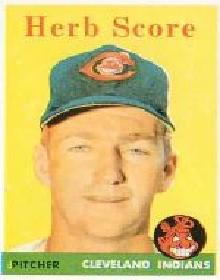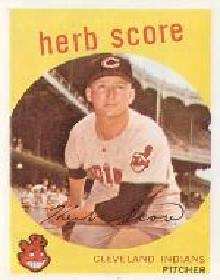Score came up as a rookie in 1955 with the Cleveland Indians. He quickly became one of the top power pitchers in the American League, no small feat on a team that still included Bob Feller, Bob Lemon and other top pitchers, going 16-10 with a 2.85 ERA in his first year. A left-hander, Score struck out 245 batters in his rookie year, a rookie record that stood until 1984, when it was topped by Dwight Gooden (Score, Gooden, Don Sutton and Kerry Wood were actually the only four rookie pitchers to top 200 strikeouts in the 20th century). Score actually topped himself in 1956, going 20-9 with a 2.53 ERA and 263 strikeouts, while reducing the number of walks from 154 to 129.
On May 7, 1957, against the New York Yankees, Score was struck in the face by a line drive off the bat of Gil McDougald, breaking numerous bones in his face and leaving him quite bloodied. McDougald reportedly vowed to retire if Score was blinded as a result, but Score actually eventually recovered his 20/20 vision, though he missed the rest of the season. Score returned late in the 1958 season, but fearful of being hit by another batted ball, his pitching motion was altered, and he was never quite the same pitcher. His velocity dropped and he became prone to injury as a result of the changed motion. Score pitched the full 1959 season, going 9-11 with a 4.71 ERA and 147 strikeouts. Score was traded to the Chicago White Sox after the season, and pitched parts of the subsequent three seasons before retiring. Score finished with a career record of 55-46 and a 3.36 ERA and 837 strikeouts over 8 seasons, in 858 1/3 innings pitched.
After retiring, Score served as an announcer on the Indians television broadcast from 1964-1967, and joined the radio broadcast, serving from 1968-1997. Score was revered by fans for his announcing style, including a low voice and a low-key style, as well as a habit of occasionally mispronouncing the names of players on opposing teams.
In 1981, Lawrence Ritter and Donald Honig included him in their book The 100 Greatest Baseball Players of All Time. They explained what they called "the Smokey Joe Wood Syndrome," where a player of truly exceptional talent but a career curtailed by injury should still, in spite of not having had career statistics that would quantitatively rank him with the all-time greats, should still be included on their list of the 100 greatest players. In the book's introduction, they used this as their reason why Score, with 55 career wins, was on their list, while Early Wynn, who won 300 games, all in the post-1920 Lively Ball Era, was not.























